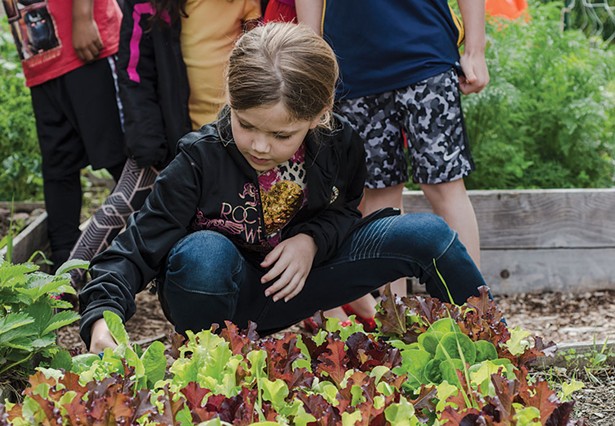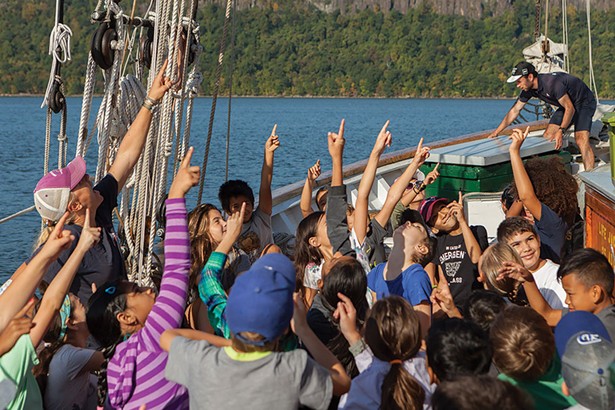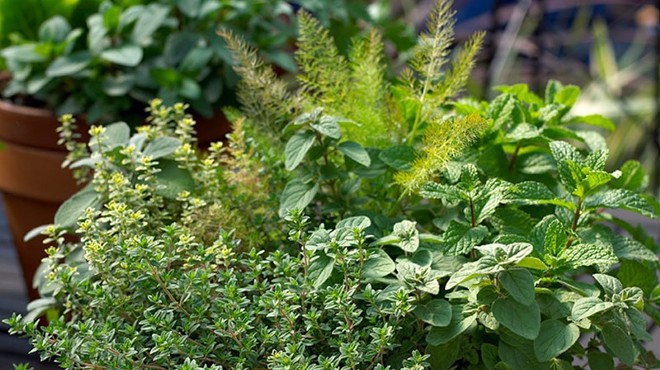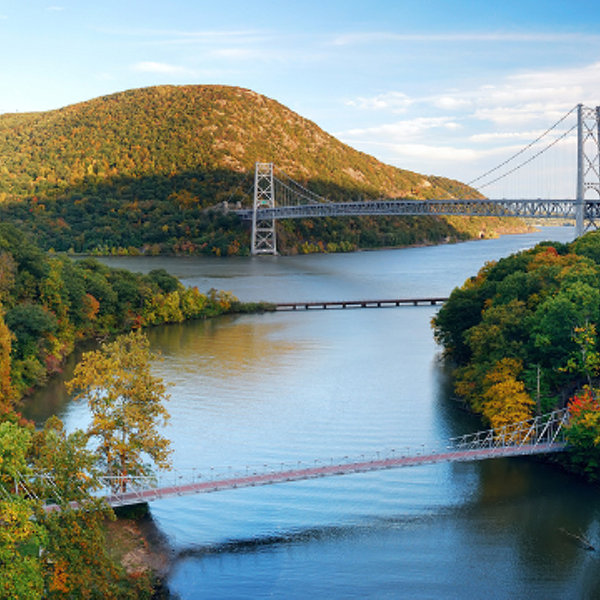Everyone agrees there are benefits of spending time in nature. These benefits are physical, psychological, and social, among others. We know this intuitively and research has borne it out (much of it compiled on Richard Louv's website, Children and Nature Network). We often think of the environment as a resource for all of us, even part of our national identity. Historically, however, the out-of-doors has been off-limits to certain groups because of lack of funds, lack of access, lack of familiarity, or outright exclusion. Racism, sexism, homophobia, and ableism have even been a part of outdoor education, intentionally or not. That appears to be changing—all over the US and here in the beautiful Hudson Valley—and this is a change worth celebrating!
Nationally, groups like Outdoor Afro and Latino Outdoors are blazing the way toward a more inclusive environment. Both the North American Association for Environmental Education (NAAEE) and the New York State Outdoor Education Association (NYSOEA), the national and state professional organizations for educators, make diversity and inclusion pillars of their missions. And locally, outdoor and environmental educators are working hard to make our mountains, rivers, and fields more accessible and inclusive for all.
"For too long due to economics nature, time in it, a connection to it, has been a luxury," says Micah Blumenthal, Wild Earth Board President, community leader, and father of campers. "Being a luxury has therefore meant that it has been the realm, largely of white people. Because wealth dictates luxury. The Earth is all of ours. Caring for it is all of our responsibility. Connecting to it holds wisdom and power for all people equally. And the effects of abusing it disproportionately affects poor people. It is vital that nature education, sustainability programs, green jobs, climate science and the like be inclusive, and truly inclusive because its future leaders will need to come from all backgrounds to lead all of us to be better stewards of this planet. It is encouraging to see many groups here in the Hudson Valley starting to venture into this work mindfully. Which is hard to do. By asking questions. By having social justice trainings and seeking to do different."

Some of our regional champions are well-established environmental conservation groups, like Mohonk Preserve and Clearwater. Some are farm and garden programs like the Farm Projects (in Kingston and Poughkeepsie) and Hudson Valley Seed. And some are wilderness awareness organizations, like Wild Earth. Whatever their approach to nature connection, all these groups see the value in hiring a diverse staff, giving their employees the right training, and actively tailoring their programs to serve normally underserved groups. They all recognize that there's a long way to go, but they are certainly moving in the right direction. Some fine examples follow.
Carriage Roads to Nature
The Mohonk Preserve was charitably carved out of the property of its namesake, the Mohonk Mountain House, in 1963. While a nature preserve surrounding an upscale resort might sound as if it's reserved for the elite, Mohonk Preserve has made strides to make its trails and carriage roads more accessible and inclusive. Mohonk Preserve is especially well-known for its NatureAccess program that helps people of all abilities access the trails, via specialized programming and all-terrain wheelchairs. Lesser known are the Preserve's programs with schools in Kingston, Poughkeepsie, and Newburgh, scholarship programs for campers; and the inclusivity directives that will be included in its upcoming strategic plan.
Take Me to the River
The sloop Clearwater, Pete Seeger's brainchild, is known for socially conscious environmental activism. A role model in hiring female leadership (including captains, crew, and educators), the Clearwater began a program over a decade ago called Young Women at the Helm—a youth leadership program for students in Hudson River cities. The program later expanded to include Young Men at the Helm and even LGBT leadership programs. These programs bring a sense of beauty and self-determination to young people who often don't get that message. And Clearwater has inspired others, including Rockin' the Boat in the Bronx (through which students build boats to race and do science on the water). "Clearwater strives to make the boat and our education programs a place for people of all races, ages, genders, and abilities to gather together in work and in song," says Maija Niemistö, Clearwater's Director of Education. "We recognize that this is a difficult task that still lies ahead of us and our nation." Learn more about Clearwater's youth empowerment programs.
Green Cities
Municipalities and city-based organizations are forming bridges to nature. The City of Kingston Department of Parks and Recreation reaches people through kayaks, hikes, and movies in the park, and Kingston's Boys and Girls Club arranges field trips to nature. In Yonkers, the Center for the Urban River brings city residents to the tideline, whether through direct environmental education or through its use as a community center. Scenic Hudson has been working with students in Poughkeepsie and Newburgh to get to know their parks, get to know their tributaries, and even to get job experience. On top of that, Scenic Hudson has been hosting Wild Earth on their property in Kingston. "We think it's extremely important to connect with our local community, and help connect our community members with their underwater ecosystem," says Elisa Caref, director of education at the Center for the Urban River. "We're working on increasing the diversity of our staff and interns as well, so when students show up they see that everyone can be a scientist, and have a viable career in this field."
Seeds of Hope
Several organizations are bringing students to farms or bringing gardens to their schools. Something about getting one's hands in the dirt and seeing a seed turn into food is especially inspiring in a city. "Teaching kids in our community, particularly cultivating young growers, through hands-on and engaging methods such as urban farming gives young people a real sense of ownership and responsibility that is much bigger than themselves," says Susan Hereth, education director at the YMCA Farm Project.
Some of the food grown is even combating the problems of local food deserts. The Poughkeepsie Farm Project has been doing great work with the city's schools since the 1990s, bringing students and teachers to the large CSA farm and helping plant gardens at their schools. Kingston's YMCA Farm Project is teaching hundreds of students, hiring teen gardeners, and providing two veggie stands—one at the Y itself and one pulled by a bike. The newest arrival to the scene is Hudson Valley Seed—arranging beautiful garden experiences for youth in Kingston, Beacon, and Newburgh.
Embracing Nature
Wild Earth teaches in the tradition of Tom Brown, Jr. and Jon Young: nature connection through powerful experiences in nature. Students track animals, make fires, and, in some programs, camp in debris shelters. While these seem like activities for the deep wilderness, Wild Earth has been expanding its programming into the City of Kingston, with its Back to School, Back to Nature field trips, guided recess programs, and afterschool programs. These grant-funded programs are giving underserved students opportunities to test their edges while experiencing the beauty of nature. Don't worry—no fires are being set on school grounds. Students play games, make baskets, and check out schoolyard nature. Wild Earth has also committed to racial justice trainings for its staff, building on the diversity of its staff, and employing a team of youth interns from Kingston to run its programs. "We are elated to have the opportunity to work with Kingston City schools and bring them out into the woods very close to their schools and neighborhoods," says Alicia Mai McNamara, Wild Earth's program director. "We are at the beginning of our journey to develop our staff to become representative of the diverse populations we are working with. We're far from where we want to be, but we are taking all the steps that we can think of to move in the right direction."
The Tip of the Iceberg
This is not a comprehensive list of all the inclusive outdoor and environmental educators of the Hudson Valley, and these organizations are still just beginning to make changes. But they show the path forward. "We have amazing organizations in the Hudson Valley doing important work at the intersections of racial justice and environmental work, and they can be great models for what this movement in the Hudson Valley can look like in the future," says Ava Bynum, founder of Hudson Valley Seed.
Turning over a new leaf
While the traditional image of a nature enthusiast is an old, white man, the image is expanding, as it should. (Case in point: The John Burroughs Nature Sanctuary, stomping grounds of our best-known local exemplar of the old white mountain man, has itself been expanding its audience to underrepresented audiences).It is a long row to hoe, but we are making progress. Our local trails, boats, farms, and wilderness are becoming more inclusive and more accessible to all people of the Hudson Valley. To echo words often spoken on the Clearwater: "Somos el barco, somos el mar, yo navego en ti, tu navegas en mi." Said another way: "We may have all come on different ships, but we're in the same boat now" (Martin Luther King, Jr.). Once again, our region can become a leading example of how human and biological diversity go hand in hand.



















